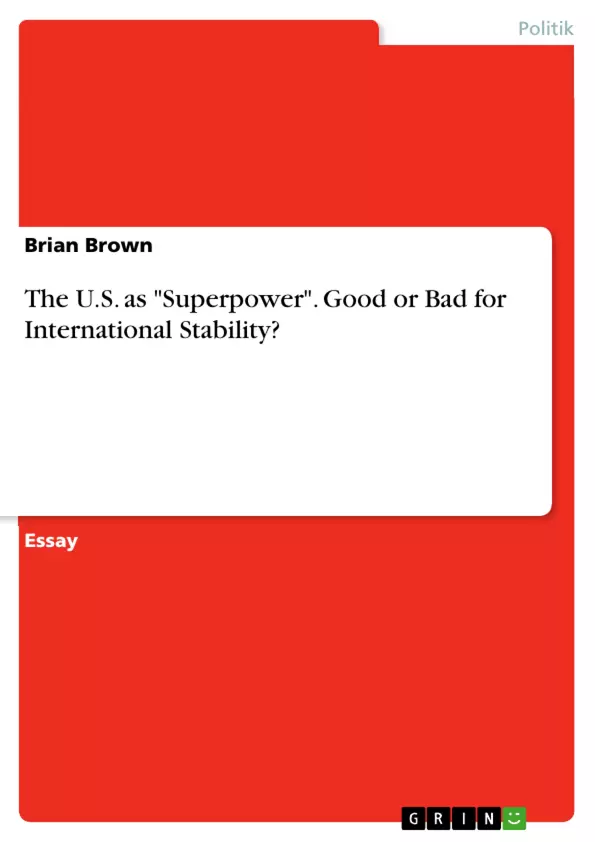United States (US) foreign policy has often centred on preserving the ‘American way of life’, yet since the fall of the Soviet Union it developed into that of being the undisputed leader of the world. The ‘balance of power’ that was afforded both before and during the Cold War is no longer. This essay will argue that the US does more harm than good in its efforts to be a ‘great’ superpower especially in this age of a one-sided ‘balance of power’. In other words, having only one real ‘superpower’ is bad for international stability.
The author will begin by defining what constitutes a ‘superpower’. He will then examine the theory of international relations with regards to the geometry of power, looking at ‘unipolarity’, ‘bipolarity’ and ‘multipolarity’. The author will subsequently take a brief look at the Cold War era, comparing it to the unipolar world that we presently have. The author will finish by examining the role that the United States plays in international affairs.
Inhaltsverzeichnis
- Was ist eine Supermacht?
- Unipolare, bipolare und multipolare Welten
- Der Kalte Krieg: Ein Vergleich
- Die Rolle der Vereinigten Staaten in internationalen Angelegenheiten
Zielsetzung und Themenschwerpunkte
Dieser Essay untersucht die Auswirkungen der unipolaren Weltordnung, in der die Vereinigten Staaten die einzige Supermacht darstellen, auf die internationale Stabilität. Es wird argumentiert, dass diese Situation mehr Schaden als Nutzen bringt.
- Definition des Begriffs "Supermacht"
- Vergleich von unipolaren, bipolaren und multipolaren Machtstrukturen
- Analyse des Kalten Krieges als Beispiel einer bipolaren Welt
- Bewertung der US-amerikanischen Außenpolitik im Kontext der unipolaren Welt
- Die Auswirkungen der US-Politik auf die internationale Sicherheit
Zusammenfassung der Kapitel
Was ist eine Supermacht?: Dieses Kapitel beginnt mit der Definition des Begriffs "Supermacht", indem es auf die historische Entwicklung und unterschiedliche Interpretationen eingeht. Es wird der Unterschied zwischen einer bloßen Großmacht und einer Supermacht herausgestellt, die globale Interessen und Fähigkeiten besitzt. Die Diskussion bezieht historische Beispiele ein und verortet den Begriff im Kontext des Zweiten Weltkriegs und der Entstehung der ersten Supermächte, den USA, der Sowjetunion und Großbritanniens. Die unterschiedliche Definition und Bedeutung von "Supermacht" im historischen Kontext wird untersucht.
Unipolare, bipolare und multipolare Welten: Hier werden die verschiedenen Modelle der internationalen Machtverteilung – Unipolarität, Bipolarität und Multipolarität – analysiert. Der Essay untersucht die jeweilige Struktur und die damit verbundenen Risiken und Vorteile für die internationale Stabilität. Der Kalte Krieg wird als Beispiel für eine bipolare Konstellation herangezogen, während die aktuelle Situation als unipolare Welt beschrieben und kritisch hinterfragt wird. Die unterschiedlichen geopolitischen Ausprägungen und ihre Auswirkungen werden beleuchtet.
Der Kalte Krieg: Ein Vergleich: Dieses Kapitel stellt den Kalten Krieg als Beispiel einer bipolaren Weltordnung dar und vergleicht ihn mit der aktuellen unipolaren Situation. Es werden die Vor- und Nachteile beider Systeme hinsichtlich der internationalen Stabilität diskutiert. Dabei wird die Rolle des Wettrüstens und der Abschreckung im Kalten Krieg analysiert, sowie die Auswirkungen des Endes des Kalten Krieges und des Aufstiegs der USA zur alleinigen Supermacht beleuchtet. Der Fokus liegt auf dem Vergleich der beiden Systeme und der Einschätzung ihrer jeweiligen Auswirkungen auf die internationale Sicherheit.
Schlüsselwörter
Supermacht, Unipolarität, Bipolarität, Multipolarität, Kalter Krieg, Internationale Stabilität, US-Außenpolitik, Internationale Beziehungen, Machtverteilung, Hegemonie.
Häufig gestellte Fragen (FAQ) zum Essay: Die Auswirkungen der unipolaren Weltordnung
Was ist der Gegenstand des Essays?
Der Essay untersucht die Auswirkungen der unipolaren Weltordnung, in der die Vereinigten Staaten die einzige Supermacht darstellen, auf die internationale Stabilität. Es wird argumentiert, dass diese Situation mehr Schaden als Nutzen bringt.
Welche Themen werden im Essay behandelt?
Der Essay behandelt die Definition des Begriffs "Supermacht", vergleicht unipolare, bipolare und multipolare Machtstrukturen, analysiert den Kalten Krieg als Beispiel einer bipolaren Welt, bewertet die US-amerikanische Außenpolitik im Kontext der unipolaren Welt und untersucht die Auswirkungen der US-Politik auf die internationale Sicherheit.
Welche Kapitel umfasst der Essay?
Der Essay umfasst Kapitel zu den folgenden Themen: "Was ist eine Supermacht?", "Unipolare, bipolare und multipolare Welten", "Der Kalte Krieg: Ein Vergleich", und implizit weitere Kapitel basierend auf den behandelten Themen.
Wie definiert der Essay den Begriff "Supermacht"?
Der Essay geht auf die historische Entwicklung und unterschiedliche Interpretationen des Begriffs "Supermacht" ein und hebt den Unterschied zwischen einer bloßen Großmacht und einer Supermacht mit globalen Interessen und Fähigkeiten hervor. Historische Beispiele und der Kontext des Zweiten Weltkriegs werden einbezogen.
Wie werden unipolare, bipolare und multipolare Welten verglichen?
Der Essay analysiert die verschiedenen Modelle der internationalen Machtverteilung – Unipolarität, Bipolarität und Multipolarität – und untersucht die jeweilige Struktur sowie die damit verbundenen Risiken und Vorteile für die internationale Stabilität. Der Kalte Krieg dient als Beispiel für eine bipolare Konstellation.
Wie wird der Kalte Krieg im Essay behandelt?
Der Kalte Krieg wird als Beispiel einer bipolaren Weltordnung dargestellt und mit der aktuellen unipolaren Situation verglichen. Die Vor- und Nachteile beider Systeme hinsichtlich der internationalen Stabilität werden diskutiert, ebenso die Rolle des Wettrüstens und der Abschreckung.
Welche Rolle spielt die US-Außenpolitik im Essay?
Der Essay bewertet die US-amerikanische Außenpolitik im Kontext der unipolaren Welt und untersucht deren Auswirkungen auf die internationale Sicherheit. Die US-Politik wird kritisch hinterfragt im Hinblick auf ihren Beitrag zur internationalen Stabilität.
Welche Schlüsselwörter sind für den Essay relevant?
Relevante Schlüsselwörter sind: Supermacht, Unipolarität, Bipolarität, Multipolarität, Kalter Krieg, Internationale Stabilität, US-Außenpolitik, Internationale Beziehungen, Machtverteilung, Hegemonie.
Welche Schlussfolgerung zieht der Essay?
Der Essay argumentiert, dass die unipolare Weltordnung, in der die USA die einzige Supermacht sind, mehr Schaden als Nutzen für die internationale Stabilität bringt. Die genaue Argumentationslinie wird im Essay detailliert dargestellt.
- Quote paper
- Brian Brown (Author), 2008, The U.S. as "Superpower". Good or Bad for International Stability?, Munich, GRIN Verlag, https://www.grin.com/document/139643



